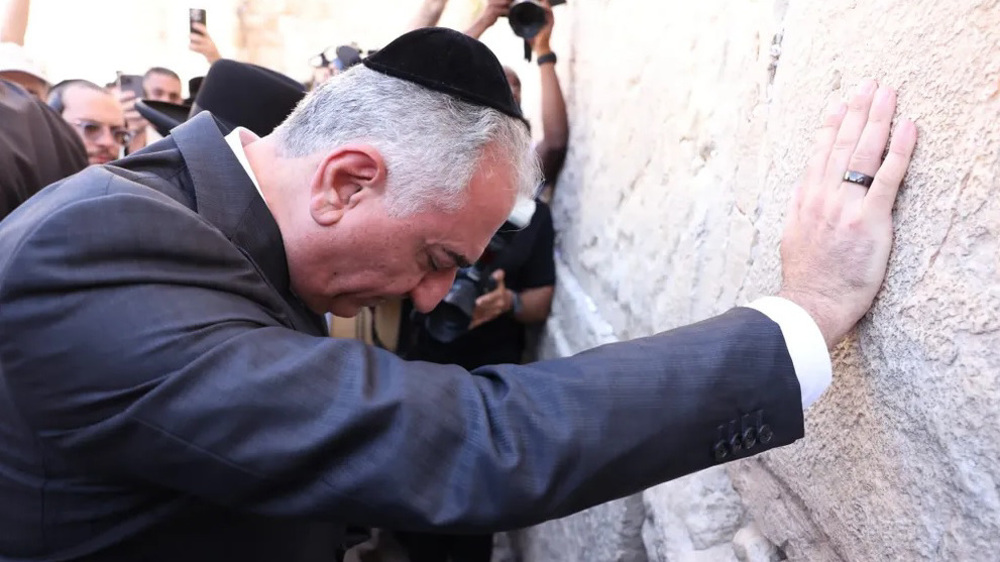AhlulBayt News Agency: Reza Pahlavi, the son of the ousted ruler of Iran, recently traveled to the occupied Palestinian territories, which demonstrates that he has no understanding of what Iranians actually want, according to a political analyst.
Setareh Sadeqi, a researcher who holds a Ph.D. in American Studies, said that Pahlavi is “detached from the realities” as he has not been inside Iran and has been on payroll by the US for years, Press TV reported.
“I think that he is so detached from the realities on the ground. He hasn’t been inside Iran and has been receiving money from the US government, probably from Iran’s frozen assets. He doesn’t attempt to understand what the Iranians inside Iran actually want,” Sadeqi said.
“If he actually looked at look back at the history of Iranians’ support for the Palestinian cause, even during his father’s ruling over Iran, he would understand how the Iranian nation has always been supportive of Palestine.”
Pahlavi is an unpopular figure who has been living in exile since the 1979 Islamic Revolution after his father was overthrown.
He stepped up his anti-Iran activities in the wake of foreign-backed riots in Iran which broke out last September following the death of young Iranian woman Mahsa Amini.
A thorough probe into Amini’s case found that her death happened due to an illness rather than alleged blows to the head by the police.
Despite that, Pahlavi and other opposition figures outside Iran seized the opportunity to join hands with terrorists and separatists operating against Iran, urging the West to give active support to the acts of vandalism inside the country.
However, after his efforts to form a united anti-Iran front reached a dead end, in April, he traveled to occupied Palestine in an attempt to ingratiate himself with the Zionist entity.
His visit was welcomed by the far-right Israeli government. Pahlavi engaged in many activities with Zionist regime officials, including meeting Israeli prime minister Benjamin Netanyahu, participating in a Holocaust Memorial Day event, and visiting and praying at the Western Wall.
Sediqi explained that all the “so-called opposition figures” who wishfully thought they could subvert the Islamic Republic were also detached from the realities on the ground in Iran and they thought that they are telling the world powers what the Iranians actually want, which was not true.
“Iranians inside Iran like any other democratic nations might have disagreements with parts of the functions of the government and they know how to voice them, they know how to pursue changes and we have been doing that through our parliament, different government bodies, and electing different people into power. But these people just wanted to pursue their own agenda,” she said.
She added that the emerging multipolarity is actually influencing how the world might view Iran and well as Palestine in the near future.
For the past months, the multipolarity is gathering pace, especially in West Asia.
In March, Iran and Saudi Arabia agreed to revive ties after 7 years. Iran-Saudi détente, brokered by China might mean an end to the 8-year devastating Saudi-led war on Yemen.
The restoration of Syria’s membership in the 22-member Arab League as a founding member on Sunday in the Egyptian capital Cairo, and the agreement between Riyadh and Damascus to reopen their embassies after more than a decade are some of the key trends which could rewrite the political map.
Moreover, Saudi Arabia, following its efforts to mend fences with Iran and Syria, is reportedly pursuing dialogue with resistance movements such as Lebanon’s Hezbollah.
Sediqi said that these are examples of how nations are brave enough to stand to the US bullying policies and to figure out a way that works better for their own nation and for the people of the world.
“This also includes more pressure on the Israeli regime because as more people and more nations want their governments to stand against the US they also want more gestures of rejecting the Israeli apartheid regime and the occupation in Palestine,” she concluded.
/129
8 May 2023 - 04:12
News ID: 1363623

Reza Pahlavi, the son of the ousted ruler of Iran, recently traveled to the occupied Palestinian territories, which demonstrates that he has no understanding of what Iranians actually want, according to a political analyst.
